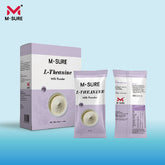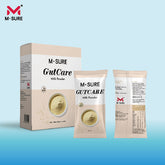Key Strategies for Elderly Health Maintenance
by
BiotechAusway
29 Apr 2025
1. Targeted Nutrition Management
Prioritize Protein
Consume 1.2 grams of high-quality protein per kilogram of body weight daily (e.g., fish, chicken breast, tofu). Aim for 30 grams of protein at breakfast to reduce muscle loss.
Calcium and Vitamin D Synergy
Drink 500ml of milk or lactose-free milk daily, paired with leafy greens and sunlight exposure (optimal before 10 a.m.) to enhance calcium absorption. Use supplements under medical guidance if deficient.
Diverse Diet
Eat 25+ types of foods weekly (e.g., yam, oats, deep-sea fish) to prevent malnutrition from repetitive diets.
2. Science-Based Exercise Strategies
Resistance Training
Perform 20-minute resistance exercises three times weekly (e.g., seated leg lifts, wall push-ups with resistance bands or light dumbbells) to strengthen lower limbs and core muscles.
Balance Training
Practice single-leg standing while brushing teeth or heel-to-toe walking. Use anti-slip mats to reduce fall-related fractures (fall fracture risk exceeds 60% in those over 70).
Moderate Aerobic Exercise
Walk 30–45 minutes daily (60–80 steps/minute) or engage in low-intensity activities like Tai Chi or swimming to maintain cardiopulmonary health.
3. Bone and Immune System Care
Sunlight for Vitamin D
Expose arms and legs to sunlight for 20–30 minutes before 10 a.m. or after 4 p.m. to boost vitamin D synthesis and lower fracture risk.
Osteoporosis Prevention
Engage in weight-bearing exercises (e.g., stair climbing, dumbbell training) to stimulate bone cell activity and improve bone density.
Immune Support
Ensure 7–8 hours of quality sleep and consume probiotic-rich foods (e.g., yogurt) to regulate gut microbiota and reduce infection risks.
4. Mental Health and Social Support
Active Social Engagement
Participate in community events, volunteering, or hobby groups to delay cognitive decline and counteract loneliness-induced aging.
Emotional Regulation
Practice diaphragmatic breathing or Tai Chi to manage stress and avoid blood pressure spikes (e.g., anger can raise blood pressure by 50 mmHg within five minutes).
5. Daily Safety and Monitoring
Regular Health Checks
Schedule annual screenings for blood pressure, blood sugar, bone density, and heart/brain function to detect chronic diseases early.
Fall Prevention
Install handrails, anti-slip mats, and ensure a safe home environment. Monitor for medication interactions that may increase fall risk.
Tobacco and Alcohol Control
Limit smoking and alcohol to protect cardiovascular and liver health, reducing cancer risks.
Key Data Insights
-
Every 5kg increase in grip strength lowers cardiovascular disease risk by 16%.
-
Walking speed ≥0.8 meters/second correlates with 15+ years of extended life expectancy.
-
Chronic negative emotions can accelerate biological aging by nearly 20 months, surpassing the harm caused by smoking.






